Tackling Loneliness annual report March 2023: the fourth year
Published 30 March 2023
Applies to England

Ministerial foreword
Five years ago, we published the first ever cross-government strategy to tackle loneliness. It demonstrated that loneliness can affect anyone and everyone, with major impacts on health and wellbeing, and laid the foundations for a generation of policy work. Since the publication of the strategy, the government has worked with a wide range of partners to raise awareness of loneliness and improve the support for lonely people in England.
We have made good progress, delivering against all the departmental commitments in the original strategy. We have reached millions of people through our annual communications campaigns which aim to reduce the stigma associated with loneliness, and delivered millions of pounds in funding to help organisations and community groups foster connections across their communities. We have built and grown our extensive and diverse Tackling Loneliness Network cross-sector group of organisations and published new research into loneliness and its impacts.
This work has revealed how loneliness can affect every area of our everyday lives, and the pandemic only highlighted the importance of social connections for people of all ages and backgrounds. We know that those more likely to experience loneliness before the pandemic were also less resilient during it, and continue to feel the impact today. Our research shows that some groups are disproportionately affected, including young people, disabled people and people who are LGBT, with barriers to support felt more in some areas of the country. Furthermore, evidence is emerging that the current cost-of-living pressure is likely to exacerbate loneliness. That is why we must not lose momentum now.
Our work will continue to be guided by the three objectives we set out in our original strategy in 2018:
-
Reducing stigma by building the national conversation on loneliness, so that people feel able to talk about loneliness and reach out for help.
-
Driving a lasting shift so that relationships and loneliness are considered in policy-making and delivery by organisations across society, supporting and amplifying the impact of organisations that are connecting people.
-
Playing our part in improving the evidence base on loneliness, making a compelling case for action, and ensuring everyone has the information they need to make informed decisions through challenging times.
We know many people still experience the negative effects of loneliness. Over the past year, we have worked across government and across society to drive forward action to tackle loneliness including:
-
Unlocking up to £30 million to increase volunteering opportunities and reduce loneliness in target disadvantaged areas through our Know Your Neighbourhood Fund.
-
Reaching millions of people through our loneliness campaign activity, embedded in the established Better Health: Every Mind Matters campaign, which also highlighted the impact of loneliness during Mental Health Awareness Week.
-
Expanding the evidence base on loneliness through commissioning research projects, including investigating the relationship between loneliness and mental wellbeing.
This year’s annual report both celebrates the progress we have made and reaffirms that tackling loneliness remains a priority for this government. It captures the ongoing and new actions that the government is undertaking over the next two years. We want to take stock at this juncture and ask, what more can we do to achieve the change we want to see?
Government cannot tackle loneliness alone, and we are grateful for the continued support of many organisations large and small. Please join us in continuing to build a more connected society, where everyone is able to build meaningful relationships.
Rt Hon Lucy Frazer KC MP
Secretary of State for Culture, Media and Sport
Rt Hon Stuart Andrew MP
Minister for Loneliness and Parliamentary Under Secretary of State for Culture, Media and Sport
Reducing stigma
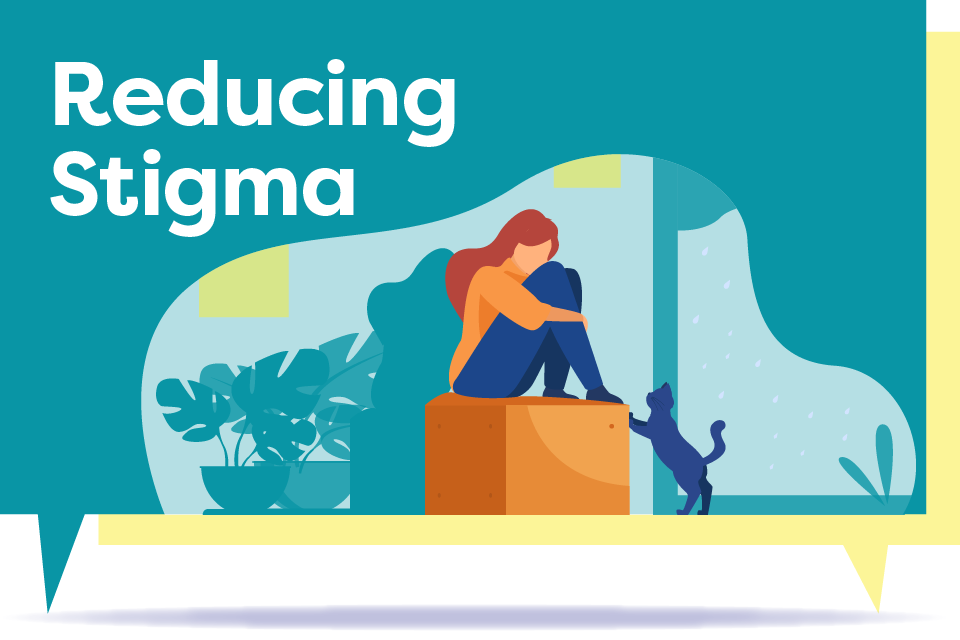
Objective One: We will reduce stigma by building the national conversation on loneliness, so that people feel able to talk about loneliness and reach out for help.
Loneliness can be accompanied by feelings of embarrassment or shame. Some people who feel lonely wonder if they are to blame, while others worry that sharing their feelings and asking for support would burden others. The pandemic highlighted that anyone can feel lonely, but it is important to continue to acknowledge and talk openly about loneliness.
Progress since 2018
Running from 2019 to 2021, the government’s Let’s Talk Loneliness campaign reached millions of people, encouraging everyone to take action to help themselves and others. We partnered with a variety of organisations including Royal Mail, ITV and others to reduce the stigma around loneliness.
In 2022, we transitioned our campaign work to become part of the established Better Health: Every Mind Matters campaign. The first phase focused on supporting young people aged 18-24 to “Lift Someone Out of Loneliness” by taking simple steps to help someone who may be feeling lonely, informed by insight that showed this group are at a high risk of feelings of loneliness but they are least likely to take action.
Alongside this, in 2021-22 the Loneliness Engagement Fund delivered nine grants totalling over £260,000 to support groups in England most affected by loneliness during COVID-19, including young adults, LGBT people and people living with a limiting health condition. The projects, led by organisations including the Jo Cox Foundation, Mencap, the British Deafness Association, the National Autistic Society and the National Youth Theatre, included communications and engagement activity to provide insight into some of the barriers these groups experience, and what works to overcome them.
Case Study: Mental Health Minute
In May 2022, loneliness was the theme of Mental Health Awareness Week. Throughout the week, the government partnered with influencers and commercial partners to encourage millions of people to talk openly and “Lift Someone Out of Loneliness”.
The campaign included a partnership with the then Duke and Duchess of Cambridge who interrupted over 500 UK radio stations for a minute.
The Mental Health Minute shared our key campaign messaging, acknowledging that anyone can feel lonely, and encouraging listeners to reach out to a friend to reduce loneliness. The broadcast was heard by 9% of the UK population and the supporting coverage reached an estimated 107.8 million people, including an international audience.
What we will do next
Stigma around loneliness persists and is little understood. The government is committed to continue the national conversation around loneliness through our public communications campaign. This includes:
Working with partners as part of the Better Health: Every Mind Matters campaign, we will continue to remind people that it is OK to feel lonely. This year we have expanded our target audience to young people aged 16-34 to encourage and empower them to take further action to help themselves and others.
We have also commissioned research to explore the relationship between stigma and loneliness, its impact on the individual and strategies to reduce it. This will be published in spring 2023.
A full list of government commitments for the next two years can be found at Annex A.
What you can do
Visit the Every Mind Matters website for top tips on tackling loneliness, and put them into action. Talk openly about loneliness with those around you, and take practical steps to help yourself and your community.
Download the campaign toolkit and help us spread the word through social media using #EveryMindMatters.
Driving a lasting shift
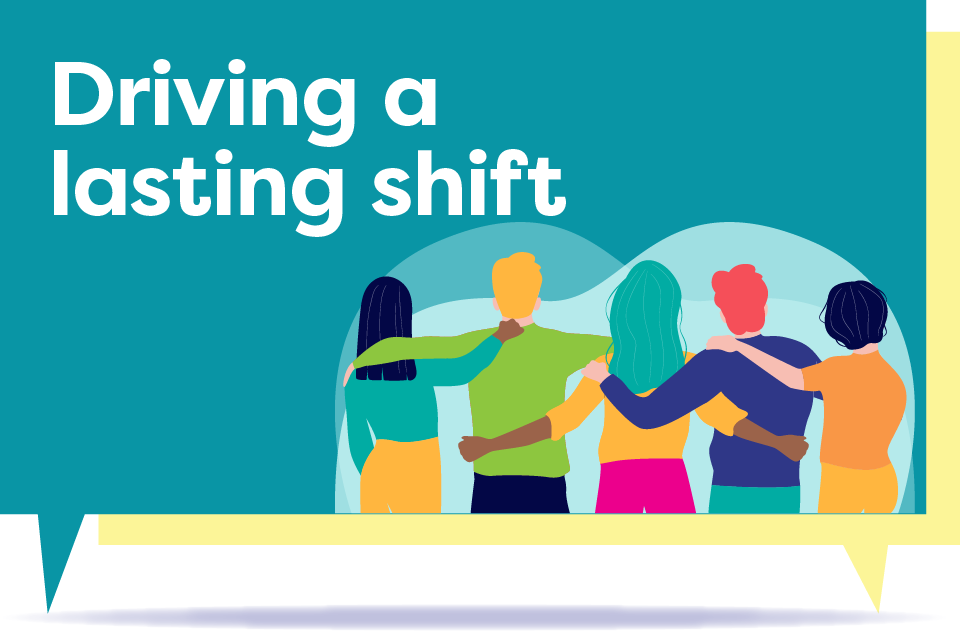
Objective two: We will drive a lasting shift so that relationships and loneliness are considered in policy-making and delivery by organisations across society, supporting and amplifying the impact of organisations that are connecting people.
Individuals and organisations across society have a part to play in building a more connected society, where people can have positive relationships that help them to thrive. We make the maximum impact when we deliver work to tackle loneliness in collaboration across government departments and across sectors.
Progress since 2018
Since 2018 the government has been a world leader in tackling loneliness. We have convened an extensive and diverse Tackling Loneliness Network, with nearly 150 organisations across the public, private and charity sectors who are working to tackle loneliness. The Network’s Action Plan has been embedded in ongoing work by government departments and cross-sector organisations, including the establishment of the Tackling Loneliness Champions Group, a Social Connection Funders Group and the Tackling Loneliness Hub.
We have continued to work with other government departments, including the Department of Health and Social Care, the Department for Education and the Department for Transport, to expand provision of volunteering opportunities and social prescribing, and to deliver the Tackling Loneliness with Transport Fund. We have also built on our international reputation, connecting and sharing best practice with Japan, Denmark, Sweden and the United States.
We launched the £5.77 million cross-government ‘Preventing and tackling mental ill-health through green social prescribing’ programme to examine how to increase use and connection to the natural environment through referral to green and/or blue social prescribing to improve mental health. The programme has recorded over 6,000 referrals to activities so far, and is gathering evidence on the effectiveness of green social prescribing and how best to implement it. Emerging findings from the programme are encouraging, showing significant improvements in participants’ mental health.
Case study: NHS receptionists’ loneliness training
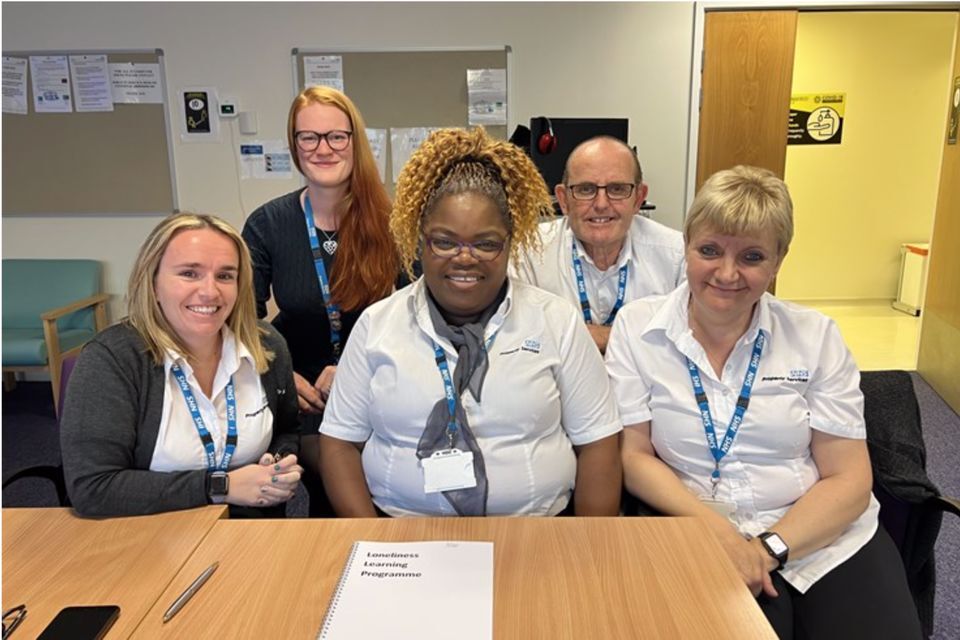
In a first-of-its-kind partnership, NHS Property Services (NHSPS) and Campaign to End Loneliness are delivering training to NHS receptionists across the country to enable them to support patients showing signs of loneliness. The training will focus on equipping receptionists with knowledge on the key risk factors of loneliness, identifying and supporting people at risk, and self-care.
Our NHS receptionists are the first port of call of people accessing medical services and are therefore in a prime position to make a difference, so we are excited to be partnering with Campaign to End Loneliness to upskill our receptionist teams in spotting and supporting those suffering from loneliness.
— Chief People Officer, NHSPS
I found the loneliness training insightful, informative, and surprising. When I was invited to participate in the training, I had in mind that the training would be aimed at spotting signs of loneliness in the elderly and vulnerable, thinking only of social isolation but this is not the case! Social isolation can increase the chances of social loneliness but is not ‘loneliness’ by itself, there are other factors. The training highlighted [that] young people experience loneliness more often than the elderly due to social loneliness, emotional loneliness, and existential loneliness.
— Kathryn, receptionist, South Chadderton Health Centre
Case study: Leeds Happy Cab
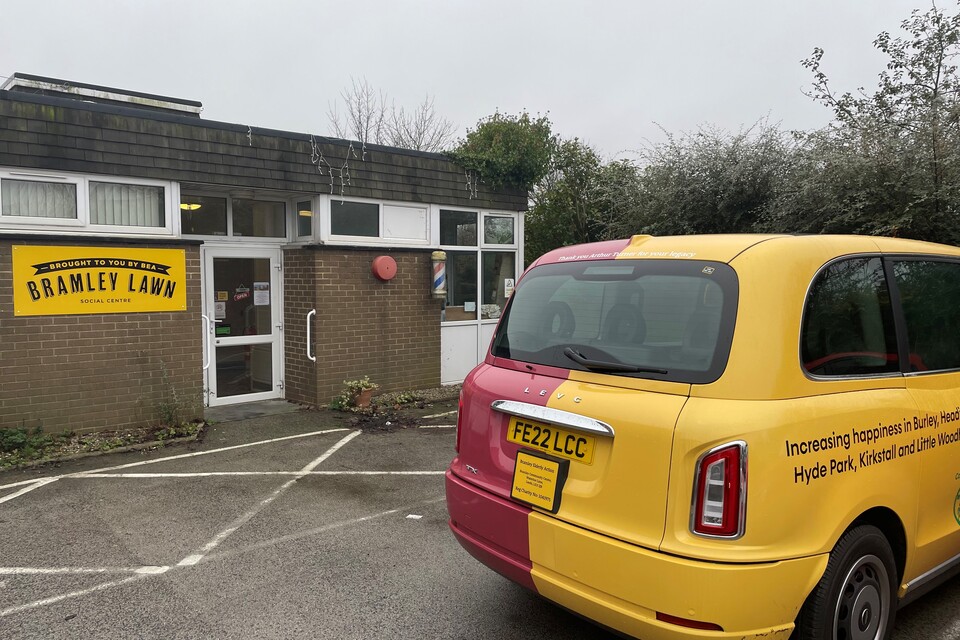
The Department for Transport’s Tackling Loneliness with Transport Fund awarded grants totalling £5 million to 12 projects to explore how transport could help people at risk of loneliness. Leeds Older People’s Forum commissioned Bramley Elderly Action to use these grant funds to purchase an electric taxi, which can be used by its members as a bookable community transport vehicle.
The Happy Cab offers a door-to-door service to get people where they need to go and have a chat on the way. Its distinctive colour scheme turns heads and raises smiles. All drivers have received ‘Happiness Training’ to help them create a positive and a welcoming environment. Journey sharing is encouraged, so that passengers can meet new people from their area and socialise. The service adds to an established minibus provision, allowing older people greater access to resurgent community groups across the city and making up for time lost to the COVID-19 pandemic.
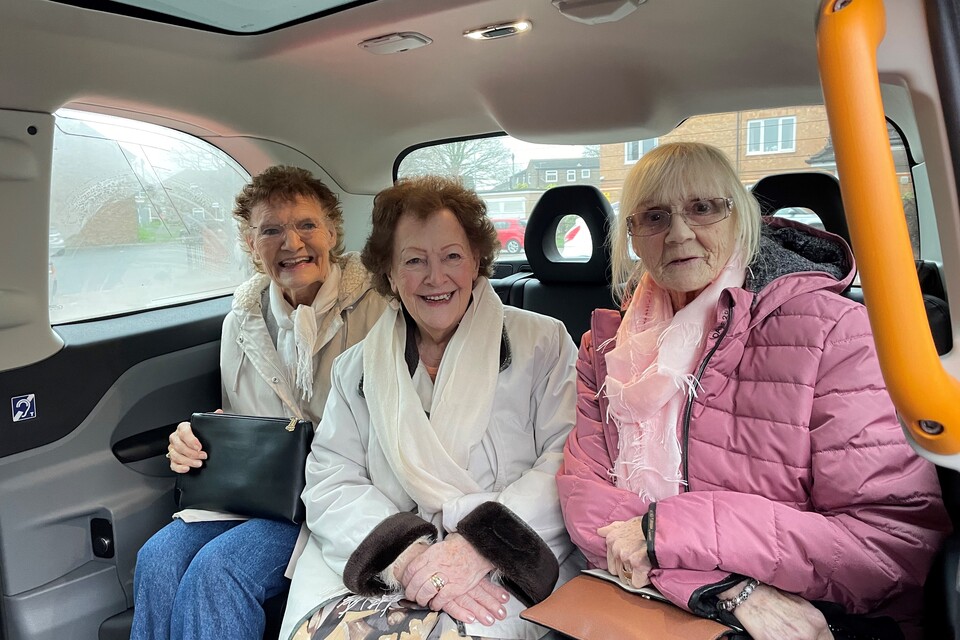
Joyce, Brighid and Valerie (pictured) are Happy Cabbers who enjoy taking rides to activities such as yoga sessions, shopping trips and Christmas quizzes.
It’s very quiet and comfortable on the Happy Cab, and easy to talk to people and get to know them. I can’t walk well but am fit in myself so a cab like this is really handy to get about and meet people, and get a lift to activities I enjoy.
— Joyce, Happy Cabber
Case study: Green Social Prescribing in Humber and North Yorkshire
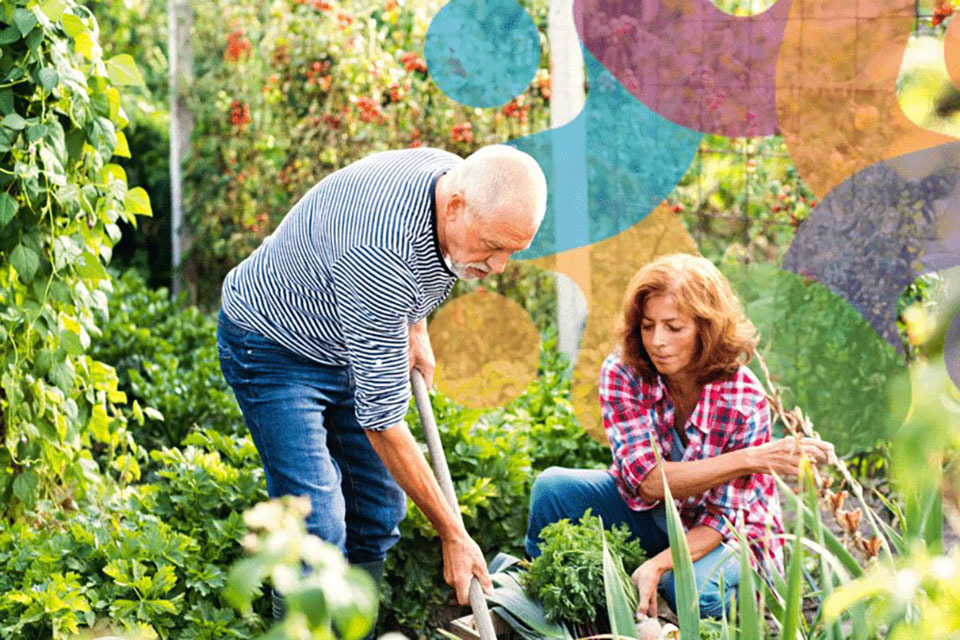
For over thirty years, ‘A’ suffered with crippling depression and suicidal ideation, and spent their life taking part in various forms of treatment to help them cope. After a prescription to start gardening was offered earlier this year, they have since been going to a community garden in Hull every week, and now they describe themselves as “happy”. The project was funded through the Humber and North Yorkshire Green Social Prescribing Fund, which is managed by HEY Smile Foundation.
I come every week and it takes me out of myself. I didn’t realise it had transformed my life but when I look back on the last few months, I can see that it has.
— A
Through the Hessle Road Network gardening project, ‘A’ has met new people, been introduced to another group, where they now work as a volunteer, and has also joined a writing group where they are writing their life story. They no longer need to visit their GP to get help or access other mental health services.
The project aims to get people moving and to help them eat more healthily, reduce isolation and improve mental health. ‘A’ now has a goal to lose weight and is so focused on improving their diet they have started growing food at home.
The Know Your Neighbourhood Fund
This year we launched the Know Your Neighbourhood Fund, with up to £30 million of funding from the government and the National Lottery Community Fund. The programme aims to empower local communities to increase volunteering and reduce chronic loneliness in 27 target disadvantaged areas in England. The Know Your Neighbourhood Fund was developed to improve our understanding of what works to boost wellbeing and pride in place in these communities and will create volunteering opportunities in local museums, libraries, voluntary arts groups such as community choirs, music and drama clubs, and connect communities through projects related to their high streets.
Know Your Neighbourhood project examples
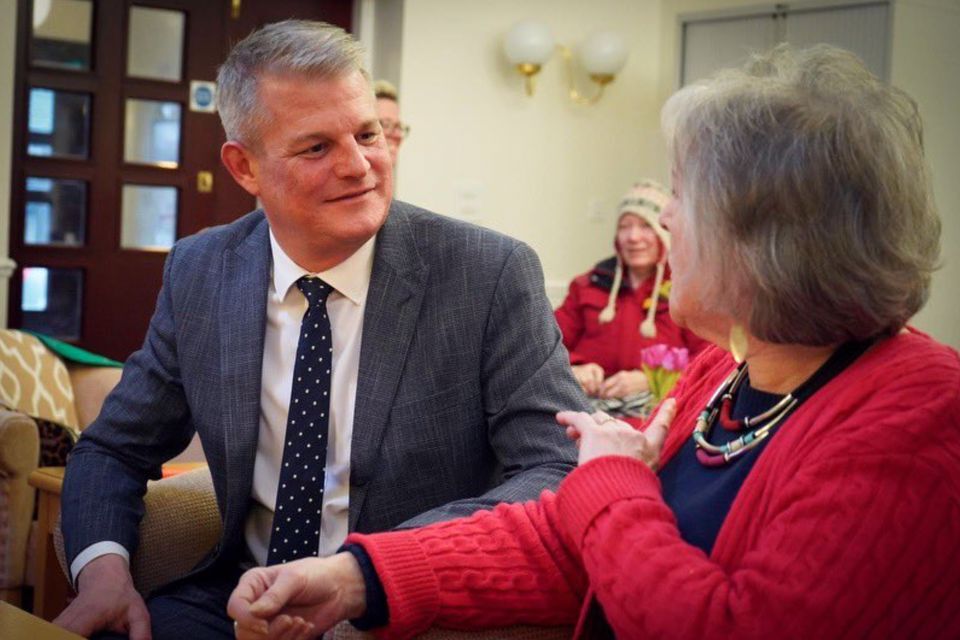
Age UK Hull is a charity working in Hull and the East Riding of Yorkshire offering support and services to older people. The project has received nearly £27,000 to widen its Home Befriending Service in Kingston upon Hull, expected to support over 170 individuals suffering from isolation by providing regular home visits to older individuals.
A Stitch Different CIC is a social enterprise made up of parent carers of young people with autism, ADHD, sensory and other disabilities in Barrow-in-Furness, who create weighted, compression and sensory products. With a fund of nearly £4,000, the organisation is working with older adults who have mental health issues, encouraging parent carers to volunteer to reduce feelings of isolation.
Rochdale Connections Trust has worked to support local people living across the Borough of Rochdale for over 20 years. Know Your Neighbourhood funding will enable the organisation to utilise a social prescriber to re-engage those who have become isolated, detached and lonely by developing a range of activities that meet the needs of the local community.
Centre 81 is a skills and activities centre for people with disabilities in Great Yarmouth. Funding will allow the project to create a supportive place for people to socialise within the newly refurbished Yare House, providing a welcoming coffee and lunch space with the opportunity to take part in a range of different activities such as crafts, cooking and woodwork.
Groundwork is a federation of charities aiming to create vibrant, green, neighbourhoods. Thanks to funding of £25,000, more volunteering opportunities have been created in the garden, café, reception and library at their Grange Park Community Hub, Blackpool. This offers volunteers the chance to develop skills, socialise and connect with their local community, with funds providing training and 1-2-1 support.
The Volunteering Futures Fund
In November 2021, DCMS launched a £7 million fund with Arts Council England, Pears Foundation and NHS Charities Together to help people access more volunteering opportunities across a range of sectors, including the arts and sport. This funding is now supporting more than 160 community organisations to provide 7,800 new volunteering opportunities between 2022-2024.
The Tackling Loneliness Hub
The Tackling Loneliness Hub, funded by DCMS and delivered by Campaign to End Loneliness, launched in June 2021. The Hub is an online community for professionals working on loneliness, enabling members working across England to connect with others through events and workshops, share the latest research and insights on what works, and collaborate on new initiatives. The Hub is open to anyone in England who is working on or interested in tackling loneliness.
The Hub now represents over 430 members from over 300 organisations across the public, private, academic, and charity sectors, including frontline delivery professionals, national policy advisors, academic researchers and local authorities. The Hub is delivering 10 workshops across the year designed to share best practice, upskill professionals with practical knowledge that can be implemented within local communities, and create opportunities to build professional networks. Topics over the past year have included workplace loneliness; befriending; loneliness evaluation; outreach and engagement; places for connection and creating a warm welcome; and language and communications.
Tackling Loneliness Hub member feedback
As an early career researcher you are constantly looking to map what is out there in terms of evidence and studies and ideas – but also where the gaps are as that might identify useful avenues to pursue in terms of future research. In research it’s always important to be looking at something original or novel. In fact I have already incorporated this into my own work.
— Hub member, academic
I just love everything. Everything’s at my fingertips. I’m involved in some other research as well with the council around care homes, healthy ageing, reducing social isolation and loneliness, and that’s a massive piece of work. And I’ve been able to signpost them to this sort of thing as well. And so for me, it’s just a lot of information, and I love being able to get to it easily.
— Hub member, delivery
What we will do next
We will continue to take a truly cross-sector approach - working with local authorities, health bodies, businesses and the voluntary sector to ensure the everyday services we use connect marginalised groups and those at risk of loneliness to support. This will aim to reduce poor physical and mental health outcomes, including suicide.
Research shows that some groups are disproportionately affected by loneliness, including young people and disabled people, with barriers to support felt more in some areas of the country. The actions we take must consider these specific barriers. For example:
Alongside our Arm’s Length Bodies (the National Lottery Community Fund, Arts Council England and the National Lottery Heritage Fund) and UK Community Foundations, the Department for Culture, Media and Sport will deliver the Know Your Neighbourhood Fund, with up to £30 million helping to boost wellbeing and pride in place by increasing impactful volunteering and tackling chronic loneliness in target disadvantaged areas. For example:
- Libraries Connected will be distributing £2.5m to up to 26 library services to develop, pilot, evaluate and disseminate services to reduce loneliness and widen volunteering opportunities. Over the next two years libraries, working with other cultural and community organisations, will deliver locally-tailored events such as family activities for under school age children, and inter-generational and cross demographic structured activities, including ‘craft and chat’ and ‘knit and natter’, to tackle loneliness and minimise social anxiety.
The Department of Health and Social Care will improve our understanding of the links between loneliness and suicide and how to tackle it. It will consider a range of risk factors, including loneliness, when developing the Suicide Prevention Strategy in 2023.
The Disability Unit is developing a communications strategy to promote social connection and raise awareness of loneliness amongst disabled people to coincide with Loneliness Awareness Week in June 2023.
As set out in the government’s strategy to reform children’s social care, Stable Homes, Built on Love, the Department for Education is committed to significantly increasing support to ensure that care-experienced children and young people have strong, loving relationships by 2027. As part of this, DfE will provide over £30 million in the next two years to significantly increase the number of local authorities with family finding, mentoring and befriending programmes, including Lifelong Links.
A full list of government commitments for the next two years can be found at Annex A.
What you can do
If you are an organisation or individual working on or interested in tackling loneliness, join our Tackling Loneliness Hub to share your experience or ideas, ask questions about best practice, get access to the latest research and connect with other local or national partners.
Expanding the evidence base
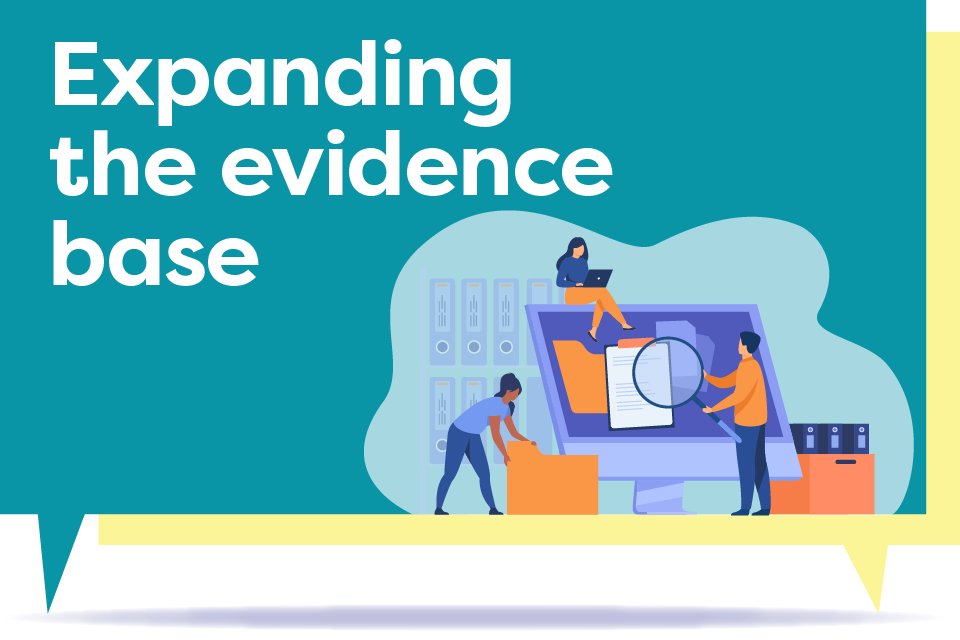
Objective three: We will play our part in improving the evidence base on loneliness, making a compelling case for action, and ensuring everyone has the information they need to make informed decisions through challenging times.
The evidence base on loneliness has grown fast since 2018, with hundreds of new studies published. While we now understand more about loneliness, its impact and how it is experienced, this can be difficult for organisations and policymakers to navigate. It is important that we continue to identify the gaps in evidence that remain and signpost the most robust evidence to inform decision making.
Progress since 2018
The number of adults (16+) experiencing chronic loneliness in England has remained consistent over the last five years at 6%, based on data from the Community Life Survey.[footnote 1] However, since 2018 we have developed a much greater understanding of which groups are more at risk of experiencing chronic loneliness.
In 2018, we introduced a new national measure of loneliness with the aim of collecting more data on loneliness and measuring it more consistently. The Office for National Statistics published a package of comprehensive information on measuring loneliness and the What Works for Wellbeing Centre has since produced methodological guidance on the use of the measurement tools for charities and social enterprises to help organisations to assess whether their interventions were helping people feel less lonely.
Data using the harmonised ONS loneliness measure is now an indicator in the Public Health Outcomes Framework and has been included in 11 government surveys.[footnote 2] Data has been collected in an additional five surveys, including the Active Lives Survey, Understanding Society and the Student COVID-19 Insights Survey.
In 2021, the government convened the Tackling Loneliness Evidence Group to bring together experts and academics in the loneliness field. The Group published an evidence review in 2022 to provide non-specialists with an informed, expert overview of the evidence gaps that still need to be filled. This table will be updated on an annual basis to reflect the latest research.
Loneliness research
Over the past year DCMS has continued to contribute to the evidence base and fill the gaps identified in the evidence review.
In June 2022 we published qualitative mental health research that shows the relationship between loneliness and mental health is bidirectional and cyclical. Mental health issues can lead to greater feelings of loneliness, while loneliness can also lead to a decline in mental health. This study also highlighted how stigma associated with mental ill-health and loneliness clearly affected participants’ ability to be open about their feelings, leading them to also feel less connected to others.
DCMS also commissioned research into the factors associated with loneliness to better understand who is at risk. Findings showed the following groups to be most at risk of loneliness:
- young people, with younger age groups progressively more likely to be lonely than people in the oldest age group (aged 65 or over)
- those with poor mental wellbeing
- people with a disability or long-standing health problem
- people not living with a partner (either married or cohabiting)
- gay, lesbian, or bisexual people and people who chose ‘other’ when asked about their sexual orientation
- people on lower incomes (those in the two poorest quintiles, compared to those in the wealthiest quintile)
- people who are out of work
- those who have recently moved to their current address
- women, who are at greater risk of loneliness than men
Further analysis was published in December 2022, exploring the impact of COVID-19 on factors associated with loneliness. The report found that the predictors of loneliness during the pandemic remained similar to those predictors identified before the pandemic - namely that women, younger people, people with a disability or long-term condition and those who did not live with a partner were significantly more likely to be chronically lonely.
What we will do next
The Department for Culture, Media and Sport will:
-
continue to explore the impact of stigma on loneliness. This research will investigate how different groups understand and talk about loneliness, what the emotional barriers are that prevent people from taking action to help themselves, and what works to reduce the stigma experienced by chronically lonely people.
-
continue working with What Works Centre for Wellbeing to explore what interventions exist to tackle loneliness and what works.
-
through the delivery of the Know Your Neighbourhood Fund, develop the understanding of what works to improve wellbeing and pride in place in targeted disadvantaged local authority areas in England through volunteering and community initiatives tackling loneliness.
The Department of Health and Social Care will:
- publish the evaluations of the primary care social prescribing model and the roll out of social prescribing in the NHS in 2025, and will seek to commission research into the links between loneliness and self-harm and suicide.
The Department for Environment, Food and Rural Affairs will:
- publish the evaluation of the green social prescribing programme in spring 2023, which will provide evidence of what works.
The Department for Transport will:
- publish the evaluation of the £5 million Tackling Loneliness with Transport Fund in autumn 2023, which will give us insight into how transport policies can reduce the number of people feeling lonely. Target beneficiaries of these projects include carers, disabled people, veterans, people living with dementia, people with sight loss, people with learning disabilities and those living with autism.
A full list of government commitments for the next two years can be found at Annex A.
Annex A: Government action
As this and previous annual reports set out, we have continued to build year-on-year on the foundations set out in the original 2018 strategy to tackle loneliness and build connected communities. DCMS continues to work in partnership with departments across government, supporting them to include consideration of loneliness in their policy making and strategic planning. In June 2022, DCMS reconvened the Inter Ministerial Group to identify new opportunities to promote social connections across our work.
The following section brings together the ongoing or new commitments government departments are delivering over the next two years to protect and improve social connectedness. Together these actions will continue to drive progress against our three strategic objectives: to reduce the stigma of loneliness; drive a lasting shift so that relationships and loneliness are considered in policy-making and delivery by organisations across society; and build the evidence base.
We will continue to engage regularly with the sector and through the Inter Ministerial Group to ensure these actions are the right ones and that we are doing all we can to boost community wellbeing.
Department for Culture, Media and Sport
DCMS leads work on loneliness policy, overseeing the delivery of the cross-government tackling loneliness strategy, collaborating with the civil society sector to support marginalised groups and those at risk of loneliness, and advocating for the consideration of loneliness in every area of policy making to build more connected and cohesive communities.
Working with partners as part of the Better Health: Every Mind Matters campaign, we will continue to remind people that it is OK to feel lonely, and encourage everyone to take action to help themselves and others. This year we expanded our focus to include 16-34 year olds, and explicitly encouraged people to take actions to help themselves (rather than focusing solely on helping others).
Alongside our arm’s-length bodies (the National Lottery Community Fund, Arts Council England, the National Lottery Heritage Fund and Historic England) and UK Community Foundations, we will deliver the Know Your Neighbourhood Fund, investing up to £30 million to boost wellbeing and pride in place by increasing impactful volunteering and tackling chronic loneliness in target disadvantaged areas. This funding will strengthen the work already being done by museums, libraries, and voluntary arts groups to foster social connections through creativity and culture across the country. It will also help develop sustainable local partnerships between statutory bodies, voluntary and community sector organisations and citizens, and advance our understanding of what works, which we will share across the sector.
The Minister for Loneliness will engage with the APPG for Tackling Loneliness and Connected Communities on their recent inquiry into workplace loneliness, working with the Department for Business and Trade and other government departments to consider the recommendations.
We will continue to build the evidence base, strengthening our case for further action. This includes:
-
Building on a Rapid Evidence Assessment completed in January 2023, we will continue to explore the impact of stigma on loneliness and publish the findings in summer 2023.
-
Working with What Works Centre for Wellbeing to explore good practice for evaluating interventions, and explore how smaller interventions can contribute to the loneliness evidence base.
-
Exploring the development of common metrics and policy goals for young people, including loneliness, in partnership with the youth sector.
-
Conducting a pilot of a nationally representative survey of young people, as part of an appraisal of the options for evaluating the National Youth Guarantee, including the standardised loneliness measure.
-
Including the loneliness measure in the #iwill evaluation to improve our understanding of how interventions in the youth sector and youth social action boost social connectedness and wellbeing.
Through the National Youth Guarantee, we are committed to every young person having access to regular clubs and activities, adventures away from home and opportunities to volunteer by 2025, supporting them to make new lasting social connections. It includes all 11-18 year olds, and up to 25 years old for those with special educational needs and disabilities. The National Youth Guarantee is supported by a three-year £560 million investment in youth services, reflecting young people’s priorities and addressing the inconsistencies in national youth spending, with a firm focus on levelling up. It will deliver:
-
up to 300 new and refurbished youth spaces and services in left behind areas through the £368 million Youth Investment Fund;
-
a reformed National Citizen Service programme for the next 3 years, with a year-round offer for thousands of young people;
-
the Duke of Edinburgh’s Awards Scheme offered to every state secondary school in England;
-
tackling current non-military Uniformed Youth Groups’ waiting lists for teenagers; and
-
tens of thousands of youth volunteering and social action opportunities via the #iwill fund.
Our new government sport strategy, which we are aiming to publish in the first quarter of 2023, will make sport and physical activity a core part of everyone’s daily life, making it more accessible, more inclusive and more sustainable. Sport has an incredible ability to reach into the places we live, reduce loneliness and build a sense of pride and belonging.
We will work with the Department for Levelling Up, Housing and Communities and the Local Government Association to continue to share learning and good practice amongst local authorities, including via the Design Code Pathfinders Network and embedding learning from the Partnership for People and Places Programme, which is testing innovative ways of working with central government to improve local outcomes.
For those unable or unwilling to own a device with internet access, public libraries play an important role in supporting digital inclusion. Around 2,900 public libraries in England provide a trusted network of accessible locations with staff, volunteers, free DCMS-funded wifi, public computers, and assisted digital access to a wide range of digital services. For many people, the reluctance to get online comes from a lack of confidence or not knowing where to start. Trained library staff and volunteers can provide library users with in-person support in using digital applications and services. Public libraries are also not just a place to go for digital support, but increasingly libraries are lending portable devices often targeted to those more likely to be digitally disadvantaged.
We will monitor delivery of government action through the Inter Ministerial Group for Tackling Loneliness, which will meet biannually, supported by lead officials in all relevant government departments.
Department of Science, Innovation and Technology
We recognise that digital skills and digital access are increasingly required to fully participate in society and stay in touch with family and loved ones. Closing the digital divide directly supports the government’s 2022 Digital Strategy, and its vision “to enable everyone, from every industry and across the UK, to benefit from all that digital innovation can offer.” To advance these priorities, we are continuing to invest in digital infrastructure and essential digital skills. We are also encouraging providers to offer social tariffs for those who cannot afford the full cost of broadband, and recognise the value provided by the public library network in providing free internet access, often with in-person support, in safe and trusted spaces.
The Online Safety Bill will make the UK the safest place to be a child online, supporting children to connect online and socialise with their peers safely and reducing the current risks they face to their safety, mental health and wellbeing.
As part of our Online Media Literacy Strategy, we are funding 17 UK organisations to pilot new ways of boosting media literacy skills, targeted at ‘hard-to-reach’ and vulnerable groups, to improve online experiences, prevent online abuse and tackle misinformation or fraud.
We will work with the Department for Culture, Media and Sport to explore the relationship between internet usage and loneliness over the next two years to better understand the positive and negative impacts of connecting online, particularly for young people at risk of loneliness and to improve digital wellbeing.
Department of Health and Social Care
We know that chronic loneliness can have a huge impact on people’s physical and mental health. Over the past five years, we have grown our social prescribing services and radically improved guidance, training and resources for health professionals to help tackle loneliness at its source and reduce the impact on public services. We are working towards a compassionate and joined-up system that ensures that anybody who is lonely, whether they have a pre-existing mental health condition or are at risk of mental health decline and self-harm and suicidal ideation, has access to a comprehensive and tailored set of community services that meets their needs and circumstances.
We will improve our understanding of the links between loneliness and suicide and how to tackle it. This will include:
-
Considering risk factors of suicide, including loneliness, for inclusion in the suicide prevention strategy in summer 2023;
-
Seeking to commission research into the links between loneliness and self-harm and suicide; and
-
Strengthening the existing Health Education England digital learning resource to include links to existing learning resources on suicide prevention.
NHS England will use existing networks and platforms to improve and maximise join-up between mental health services and local social prescribing link workers, and within Primary Care Networks, including:
-
Encouraging stakeholders, including those with helplines and SMS support, e.g. the NHS Volunteer Responders, to signpost to loneliness interventions including social prescribing;
-
Integrating social prescribing into basic mental health training to help with early intervention;
-
A promotional push of Health Education England education resources explaining social isolation and loneliness to health and volunteer workforce.
In December 2022, the Secretary of State for Health and Social Care announced £3.6 million funding to support the National Academy for Social Prescribing for the next two years. This will ensure the continued improvement and success of social prescribing connector schemes across the whole country, working in partnership with bodies like Arts Council England:
- Arts Council England published a dedicated Creative Health & Wellbeing plan last year, designed to promote creative health as a fundamental part of living well for individuals, communities and globally. As part of this, a creative health programme in partnership with the National Centre for Creative Health is exploring the barriers and opportunities to embed personalised creative health opportunities in Integrated Care Systems. Arts Council are also funding an Arts and Culture Lead at the National Academy of Social Prescribing to link national and regional policy in this field and are supporting the Culture Health and Wellbeing Alliance and their national network of creative practitioners to develop a quality framework that encourages good practice in creative health work.
We are working with NHS England and the Carers Partnership, formed of the Carers Trust and Carers UK, to produce a social prescribing summary document to be disseminated to local carers organisations. It will upskill staff at carers organisations on social prescribing as an intervention for loneliness, and aim to improve the health and wellbeing of unpaid carers. This work will increase the consistency of the social prescribing offer to carers across England, as the government’s provision of social prescribing link workers continues to increase.
We will publish the evaluations of the primary care social prescribing model and the roll out of social prescribing in the NHS in 2025. A separate evaluation is also taking place for the green social prescribing programme, which will be published in summer 2023. NHS England is also supporting other organisations to carry out evidence reviews of a range of social prescribing models and provisions.
Through the Voluntary, Community and Social Enterprise (VCSE) Health and Wellbeing Alliance, we are supporting several initiatives to reduce health inequalities. For example:
-
Carers UK, in partnership with Sport England and funded by the National Lottery, are exploring ways to support carers in England to take part in more physical activity as a way to reduce loneliness and improve their wellbeing. The new Carers Active April campaign will launch for its second year in 2023, raising awareness of the benefits of physical activity and opportunities to take part.
-
FaithAction has designed a programme of work to upskill faith-based and community organisations in measuring impact around tackling loneliness. In 2023 they are producing a best practice guide on using social prescribing and reducing loneliness in communities. In 2024, Faith Action will bring this work together, implementing and evaluating a localised inclusive social prescribing pilot, in partnership with statutory partners and grassroots faith and community groups. This will include an evaluation report with recommendations for wider rollout across the country.
Health Education England will build on its existing digital learning resource for loneliness and social isolation. All resources will be designed with the intention of building knowledge and understanding of loneliness amongst those working in health, care and allied sectors that can support someone experiencing loneliness.
Health Education England will develop a “Supporting you to support others” podcast series providing practical tips and tools for health professionals.
Department for Environment, Food and Rural Affairs
Green spaces in rural and urban areas have been shown to be highly beneficial to health and wellbeing and provide space for people to meet. Evaluation of the green social prescribing programme is underway to provide evidence on what works and inform future projects and support more people. Defra is also committed to ensuring that community infrastructure in rural areas empowers social connections, from supporting the welfare of farmers to working with the Department for Transport on local solutions.
We will deliver our Environmental Improvement Plan, published in February 2023, which includes a commitment that the public should be able to access green space or water, such as woodlands, wetlands, parks and rivers, within a 15-minute walk from their home.
We will publish our evaluation of the first phase of the green social prescribing programme in spring 2023, and will go further, including:
-
Exploring options for how best to embed green social prescribing, including across multiple healthcare pathways;
-
Driving the roll-out of social prescribing more broadly, so that at least 900,000 people will be referred to social prescribing by 2023 to 2024; and
-
Implementing a cross-government working group on green social prescribing, so that the partnership formed through the programme can continue to work together and advocate for green social prescribing across government and beyond.
In December 2022, we launched the £3 million Platinum Jubilee Village Hall Fund to renovate vital community assets, ensuring rural areas have appropriate infrastructure to facilitate social connections. It is anticipated that the fund will support around 125 village halls over a three-year period, creating bigger, better and brighter village halls for communities to enjoy. The first grant awards will be made in April 2023.
We support community infrastructure and community action to tackle loneliness in rural areas via our ongoing funding of Action with Communities in Rural England (ACRE). Their work in this area includes supporting initiatives which address social isolation and loneliness.
We will include tackling loneliness as an objective for the Farmers Welfare Forum, sharing what works and signposting to support via the Future Farming Resilience Fund.
We will regularly bring together 15 rural community organisations working to tackle loneliness, looking into issues surrounding transport, connectivity and community in a rural context.
Department for Education
Research shows that young people are at a high risk of loneliness but also least likely to take action. For some groups, such as those with experience of the car system, the risk is even greater. This is why we are committed to ensuring all families and young people have the skills and opportunities they need to build strong relationships and meaningful social connections, to protect against loneliness.
Family hubs are ‘one stop shops’ that make it easier for families to get the support they need, with a focus on supporting and strengthening the family relationships that carry us all through life. The government is investing around £300 million to enable 75 local authorities to create family hubs, and to improve vital services to give every baby the best start in life. This builds on £12 million transformation fund to open family hubs in a further 12 local authorities in England. We will continue to roll out family hubs in these 87 local authorities, by March 2025, which will help families to access a range of services, including:
-
helping facilitate local community connections through community and peer-led support, support for new parents and youth services;
-
supporting mental health and wellbeing through family hubs by signposting to online resources like Every Mind Matters, which includes online advice and support for loneliness.
We will continue to deliver our comprehensive attendance strategy to improve school attendance, which in turn will help to protect against loneliness in children and young people. Our actions includes:
-
reviewing the system as a whole and publishing updated expectations setting out how schools, trusts and local authorities should work together to improve attendance;
-
establishing a better flow of pupil level attendance data to help schools and LAs to identify children at risk of persistent absence and to enable early intervention;
-
convening the Attendance Action Alliance – a group of national leaders from education, children’s social care and allied services to work together to raise school attendance and reduce persistent absence through targeted pledges.
We are monitoring implementation of the relationships, sex and health education (RSHE) curriculum, which includes content on how isolation and loneliness can affect children. We have brought forward our review of the RSHE statutory guidance and will conduct a thorough consultation later this year so that people with an interest can provide their comments and ideas. Following the consultation, we will make a decision about any new or revised content to be included in the RSHE curriculum.
We will deliver on our commitments, outlined in the Schools White Paper, to help schools deliver a richer school week and offer all pupils a range of high-quality enrichment activities, increasing opportunities for social connection. This will include:
-
publishing a new sport strategy and an update to the School Sport and Activity Action Plan. This will build on our recently announced package of activity to boost equal opportunities in school sport both inside and outside the classroom;
-
taking forward the commitments in the 2022 National Plan for Music Education and working with DCMS and Arts Council England to publish a cultural education plan;
-
working with DCMS to help schools ensure pupils can get the most out of the National Youth Guarantee, including providing up to £3.4 million to allow more schools in the most disadvantaged areas of the country to offer their pupils the Duke of Edinburgh’s Award;
-
continuing to support the expansion of the Cadets, to help achieve the government ambition of 60,000 cadets parading in school cadet units by 2024.
We will continue to support schools to open their facilities for sport and physical activities outside of school hours, through our Opening School Facilities programme. This will provide more opportunities for pupils, families and the wider community to stay active, improve their physical and mental health, and make social connections. We have appointed a consortium, led by the National Active Partnerships team, to work with schools to develop bespoke plans to open their facilities. This is backed by up to £57 million to March 2025, at least 90% of which will go directly to schools.
We will continue to work with the Office for Students (OfS) to support Student Space, a mental health and wellbeing online platform designed to bridge any gaps in support for students and to work alongside existing services, including developing resources to support social inclusion. This will build on our strategic guidance to OfS, asking that it continues to fund Student Space.
We have also asked OfS to establish and disseminate ‘what works’ across the sector to help universities and colleges make use of effective practice in supporting mental health. This work will lead to the creation of a central online hub to share what works to support student mental health and we will continue to support the adoption of effective practice throughout the sector.
We will continue to strongly support the University Mental Health Charter, led by Student Minds. The charter brings together universities to share effective practice and create cultural change around mental health, and includes guidance on loneliness.
As set out in the government’s strategy to reform children’s social care, Stable Homes, Built on Love, the Department for Education is committed to significantly increasing support to ensure that care-experienced children and young people have strong, loving relationships by 2027. This includes:
-
providing over £30 million in the next two years to significantly increase the number of local authorities with family finding, befriending and mentoring programmes including Lifelong Links;
-
working with the Department for Science, Innovation and Technology to ensure care leavers have access to the digital skills and resources to facilitate social connection and access support; and
-
working with the Department for Culture, Media and Sport to ensure that the specific needs and barriers faced by care leavers are factored into the delivery of the cross-government tackling loneliness strategy, including any new research and the design of interventions to tackle loneliness.
Department for Transport
Over the last five years the Department has built partnerships with transport providers and community groups to explore how transport can be used to help tackle loneliness. We are committed to evaluating the interventions we have trialled and will use industry-wide forums to promote the role that inclusive transport can play in supporting community infrastructure and empowering social connections.
In 2022, the Tackling Loneliness with Transport Fund made grants totalling £5 million to 12 delivery partners in the public sector to develop our understanding of the ways in which transport could alleviate loneliness. An evaluation of these pilots will be published in autumn 2023.
We will continue to explore how Mobility Centres and their Hubs Mobility Advice Service can help to tackle loneliness experienced by older and disabled people.
We are in the process of updating the statutory Local Transport Plan guidance and aim to consult in 2023. The draft guidance encourages local authorities to consider Community Transport in the context of reducing social isolation and asks them to consider ways to improve connectivity in rural areas.
We are aiming to publish the Future of Transport Rural Strategy in 2023. This strategy will show how new and emerging technologies and trends in transport can tackle loneliness and isolation. This will include a focus on increased access to transport, better digital connections in rural areas, and the expansion of shared transport modes.
The government supports spending of around £1 billion annually on concessionary travel (for those over the state pension age and eligible disabled people) on buses, helping those who are more likely to be at risk of loneliness, and supporting the viability of bus services. Local buses are the most commonly used mode of public transport, particularly for older people, and are a key part of access to services and social networks.
DfT’s multi-billion pound annual investment in bus and train subsidies, including the £2 bus fare cap (£135 million from 1 January to 30 June 2023), is making the transport system more financially accessible to all users. This includes groups disproportionately affected by loneliness such as older people, younger people aged 18-24 and disabled people.
Government Equalities Office
Evidence shows that LGBT people are disproportionately affected by chronic loneliness. We want to better understand why, the impact across different age groups and the barriers to accessing support.
We will work with the Department for Culture, Media and Sport to explore drivers of loneliness and what works to tackle loneliness experienced by LGBT people.
The Disability Unit
The causes of loneliness among people with a health condition or disability are complex. We want to be able to tailor support effectively and are committed to improving our understanding of lived experience of loneliness among disabled people to better embed strategies to tackle it in disability policy.
We will develop a communications strategy to promote social connection and raise awareness of loneliness amongst disabled people to coincide with Loneliness Awareness Week in June 2023.
We will consider loneliness in our policy development and implementation, and include loneliness as an agenda item for discussion at regular disability stakeholder forums.
Following completion of the lived experience evidence review which included consideration of loneliness amongst disabled people, we will use the evidence gained from the literature review to host an internal workshop to consider how loneliness can be better embedded in disability policy.
We will consult on and publish a new Disability Action Plan in 2023. The Plan will set out the immediate actions the Government will take in 2024 to improve disabled people’s lives, as well as laying the foundations for longer term change. One of the priority areas is participation in social and physical activities for disabled people. Participation in community life is vital for health and wellbeing, promoting a sense of belonging and tackling loneliness, and we will be working with key stakeholders and disabled people to develop the policies the government will take forward to improve disabled people’s lives.
The Office for Veterans’ Affairs
We continue to seek to support the evolving needs of former service personnel, including looking at social isolation, relationships and community integration. We are committed to improving our understanding of the trigger points for veterans, barriers to seeking support and what works to alleviate the impact of loneliness.
The Minister for Veterans’ Affairs will host a roundtable in spring 2023 for organisations supporting veterans, to raise awareness and explore what works to tackle loneliness to maximise the wellbeing of the veteran community. - We will include the harmonised loneliness measure in the annual Veterans’ Survey.
Department for Levelling Up, Housing and Communities
We recognise the role that our physical environments and our communities play in promoting positive social connections and a sense of belonging. Designing places and building communities in a way that promotes social interaction and enables people to connect meaningfully with others is therefore vital. The Levelling Up White Paper included missions on Pride in Place and Wellbeing, demonstrating our commitment to promoting positive social connections and improving community engagement in all parts of the UK. We will use our expertise (including our Spatial Data Unit) to continue to build the evidence base on loneliness and reduce spatial disparities by supporting place-based interventions.
We will work with the Office for Health Improvement and Disparities to consider loneliness when setting standards for local design and planning. This includes sharing recent evidence on loneliness and the built environment through the Design Code Pathfinders Programme.
We will use our Levelling Up Mission on wellbeing to develop a strategic approach to wellbeing in place that recognises the wellbeing benefits of tackling loneliness and the importance of promoting good social relationships and community connectedness.
We will continue to support other Departments to build the evidence base on loneliness and to develop targeted, place-based interventions that are supported by geospatial data analysis.
Through the Faith New Deal Fund, we are testing what can be achieved when faith groups work in partnership with local authorities and other partners to deliver public services and tackle specific social challenges, including tackling loneliness.
Department for Business and Trade
Employment can be a vital lifeline for social contact and we also know that loneliness and poor mental health can impact people’s ability to participate in the labour market. This is why we are committed to new policies to increase workforce participation, protect vulnerable workers and give businesses the confidence to create jobs and invest in their workforce.
Alongside the Department for Culture, Media and Sport, and other government departments, we will engage with the APPG for Tackling Loneliness and Connected Communities to tackle loneliness in the workplace, building on the report on employers and loneliness published in 2021, we are supporting a package of policies to further workers’ rights across the country, such as:
- supporting parents of babies who need neonatal additional care with paid neonatal care leave;
- offering pregnant women and new parents greater protection against redundancy;
- entitling unpaid carers to a period of unpaid leave to support those most in need; and
- providing millions of employees with a day one right to request flexible working, and a greater say over when, where, and how they work.
Department for Work and Pensions
We know that Jobcentres carry out a hugely important role in identifying people at risk of loneliness, directing people to tailored support and helping them return to, or prepare to return to the labour market. We recognise that there is a correlation between loneliness and unemployment, so by supporting people into good work, we will help to build their confidence and social connections and boost their wellbeing.
We will continue to explore how volunteering opportunities can be utilised to reduce loneliness in certain groups of people using the benefits system.
We will continue to improve and expand how the Jobcentre Plus Network signposts customers to social prescribing services where appropriate.
We will share information and opportunities identified by the Department for Culture, Media and Sport to support the unemployed and veterans at risk of loneliness through the Jobcentre Plus network.
The Home Office
We recognise the far-reaching impact loneliness can have on people’s wellbeing. We are committed in our collaborative approach across government to tackle this key issue and bring about meaningful change for those experiencing loneliness.
We will work with the Department of Health and Social Care on the Safe Care at Home Review, to provide increased opportunity to support social connection for those who have care in their homes.
We will continue to work closely with the Department for Science, Innovation and Technology on the Online Safety Bill, to support connecting safely online and reduce the risks of internet use.
We will use the ONS loneliness measure to assess effectiveness of mental health and wellbeing projects run with asylum seekers.
Ministry of Justice
Strong community and social ties are a key factor in preventing re-offending, and reducing loneliness is critical to providing prisoners and prison leavers with meaningful lives in custody and upon release. We want to create services which increase social connectedness among our users and staff to create communities which are respectful, safe and healthy.
We are testing an approach based on the Social Prescribing model to connect people on probation with their local communities to improve self-esteem, create opportunities to develop pro-social networks and reduce feelings of isolation and loneliness. The model employs a Social Navigator to assess individuals’ interests and motivations, linking them with a peer mentor and supporting their attendance with community groups and activities. This in turn provides strong foundations for employment and accommodation outcomes.
We are also collaborating with the Behavioural Insights Team to test a more formalised approach to engaging families and significant others in probation supervision, which has shown some promising outcomes.
We are delivering a new workstream of the Prison Leavers Project to explore current wellbeing issues that impact staff in prisons and probation. This includes building the evidence base on the causes and impact of prevalent staff loneliness and isolation.
What to do if you are feeling lonely
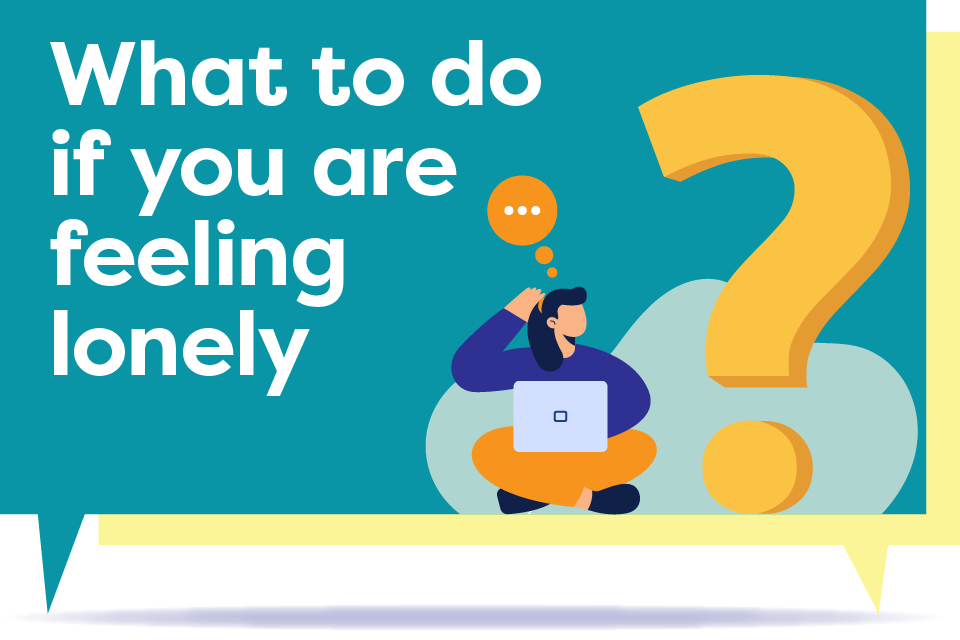
Feelings of loneliness are experienced differently by everyone, and it is important to remember that we can all feel lonely at times. We may feel lonely even if we are surrounded by others. You should not blame yourself for feeling like you are struggling, now or at any other time.
Loneliness has no common cause. Sometimes it can be triggered by a life event or change in situation, or it may not be triggered by anything at all. This also means that there are lots of ways we can try and overcome loneliness, accessing the right help and support. It’s really important to remember that loneliness and difficult feelings can pass.
Top tips
To support those around you, or yourself, you may want to take some of the actions below. More information on what you can do if you are feeling lonely is available on the Every Mind Matters website.
-
Keep in touch with those around you
-
Join a group
-
Do things you enjoy
-
Share your feelings - but don’t compare yourself to others
-
Help someone else feel connected (including by volunteering)
Support
You may feel that you cannot put these steps into action and this could be for any reason. Be patient with yourself or others, as tackling loneliness and the negative emotions that can accompany it can take time to pass. If you feel you would benefit from more support, information is available on the Every Mind Matters website.
Services and interventions for tackling loneliness can differ from place to place, but your local council website may be a good place to start. You could also find out more about the social prescribing offer from your local Primary Care Network, which can help people to connect in their community by referring them to activities that meet their needs and align with their interests. The Hub of Hope, the UK’s leading mental health support database is another brilliant resource, which signposts support and lists thousands of regional and national support groups and services in the local area.
-
Community Life Survey 2021/22 - Wellbeing and Loneliness - GOV.UK ↩
-
Health Survey England, Smoking, drinking and drug use among young people in England, Mental Health of Children and Young people Survey, Participation Survey, English Housing Survey, Tri-Service Families Continuous Attitudes Survey, the Community Life Survey, National Travel Survey, The people and Nature Survey Longitudinal study of young people in England and the National Survey of Veterans (began in 2022) ↩
